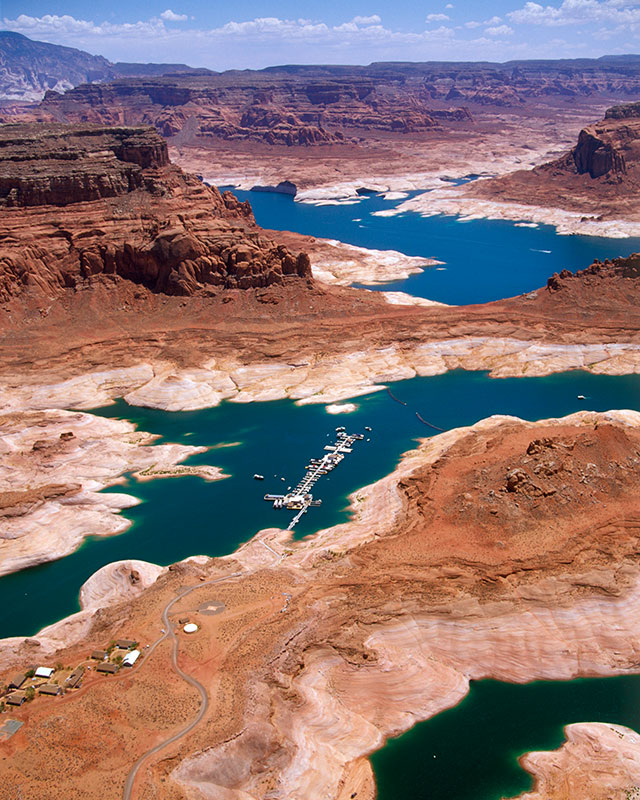BLOG
June 29th, 2021
Via Sustainable Waters, an article on the increasing water stress on the Colorado River:
The US Bureau of Reclamation, in its most recently published “24 Month Study,” projects that Lake Powell on the Colorado River will be three-quarters empty by New Years Day.
There are three reasons that Lake Powell is drying up: (1) natural runoff in the basin has been lower since 2000 due to drought and climate warming; (2) the four states dependent on that runoff have not decreased their water use in response to lessened water availability; and (3) the Colorado River Compact requires that a specified volume of water is to be released from Lake Powell to meet the water needs of downstream states.
Over the course of this year (2021), the lake will have lost 3.6 Million Acre Feet (MAF) of water, a 48 foot drop in water level.
At that point, there will be only 6.5 MAF left in the reservoir (full capacity is 26 MAF).
Now imagine that the lake drops ‘only’ 2.5 MAF next year. It’s not hard to imagine that, because it’s happened six times since 2000, and we seem to be in a pretty bad run of drought years lately.
If the reservoir — formed by Glen Canyon Dam — drops that much next year, hydropower production will cease because the lake will have dropped below the dam’s power intakes. Electricity from the dam is distributed throughout the Southwestern US, from Nebraska to Arizona.
The elevation of Lake Powell’s water level has fallen more than 120 feet since New Year’s Day 2000. Other measurements shown are for New Years Day of each year. The elevation for 2022 is projected by the US Bureau of Reclamation.
An Ominously Quiet Summer
The Bureau’s study also projects that by August (yes, just a month from now), the reservoir level will be too low to keep any of the thirteen marinas and boat launches on the lake in operation.
The lake will be a very quiet place this summer without the roar of speedboats and boomboxes blaring from houseboats. The lake levels projected by the Bureau’s study indicate that marina closures will persist through next summer.
The loudest sound likely to be heard next year might be the screaming of the 25 million water users located downstream of Lake Powell who will be rightfully fearing that if the lake level is not stabilized soon, it will reach a point where it will be physically impossible to release enough water from Powell’s bowels to meet their needs.
Dangling Rope Marina, one of many stranded by falling lake levels.
Photo courtesy of Bureau of Reclamation
Overdraft at the Water Bank
The response of the Upper Basin states to this calamity is to “…consider releases of water to Lake Powell from the upstream reservoirs of Flaming Gorge, Blue Mesa, and Navajo.” The idea is to pull water from storage in the upper reservoirs and move it into Lake Powell in an effort to stabilize Powell’s water level.
Think about it this way. You’ve been over-drafting your checking account (the Colorado River) for years. You repeatedly take money out of your savings account (Lake Powell) to keep your checking account active. However, now that your savings account is empty, you start wracking up debt on your credit cards (upstream reservoirs).
If a credit rating system existed to evaluate the credit worthiness of state water agencies, they would surely receive a very poor rating. They’ve been borrowing too much for too long and those debts are coming due. (Perhaps it’s time to think about spending less?)
To place this idea in another context, consider the fact that the total volume presently stored in those three upstream reservoirs sums to 4.6 MAF. If we have another year like this year, in which Lake Powell lost 3.6 MAF, most if not all of any water tapped from those upstream reservoirs would be gone by the end of next summer. And those three upstream reservoirs would be much, much lower, if not bone dry.
As I’ve told my university students on many occasions, the thing about water transfers is that you risk spreading water scarcity problems to the places you’re taking the water from. Each of the three reservoirs being considered to aid Lake Powell have enormously popular recreational economies of their own at risk.
The Dubious Future of Lake Powell
There are a number of organizations in the Southwestern US that have long called for the draining of Lake Powell and decommissioning of Glen Canyon Dam. Regardless of how you might feel about that proposition, it is fair and appropriate to ask whether the scope and pace of response being marshaled by the Upper Basin states is sufficient to keep Lake Powell from being drained.
I never thought I’d live to see the day when a former commissioner of the Bureau of Reclamation would utter these words:
“Glen Canyon Dam is the dinosaur of the dam world,” said Dan Beard, former Commissioner of the Bureau of Reclamation. “We need to prepare for unprecedented low flow conditions on the Colorado River in the coming years that would drain Lake Powell. The time has come for the dam to be decommissioned and torn down.”
We’re living in a strange new world, to be sure.


